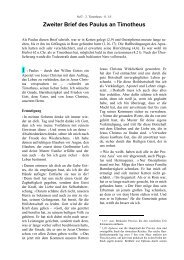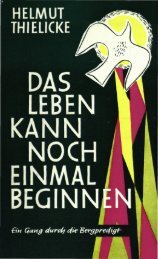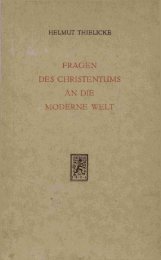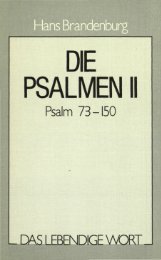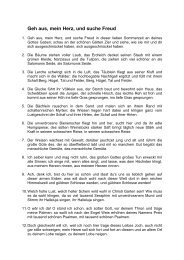You also want an ePaper? Increase the reach of your titles
YUMPU automatically turns print PDFs into web optimized ePapers that Google loves.
municate, to evaluate, and to be creative and<br />
inventive.<br />
Between the brain stem and the cortex are various<br />
structures which play a major part in the<br />
regulation of such things as body temperature,<br />
blood pressure, pulse rate, blood sugar and electrolyte<br />
levels, among others. The hypothalamus<br />
and the pituitary gland play an important role in<br />
this system. The former can be regarded as the<br />
“brain” of the brain. The size of a pea and weighing<br />
only about four grams, it is the most complex<br />
and amazing part of the brain. It controls eating,<br />
drinking, sleeping, alertness, body temperature,<br />
the equilibrium of many physiological processes,<br />
pulse rate, hormones, and sexuality. It also controls<br />
the most important gland in the brain,<br />
namely the pituitary gland, by means of a combination<br />
of electrical and chemical messages. The<br />
pituitary in turn controls many body functions<br />
through hormones, which are chemical substances<br />
carried by the blood to specific target<br />
cells. The targets of the pituitary’s hormones are<br />
often other hormone-secreting glands (e.g. the<br />
thyroid and adrenal glands). The pituitary acts<br />
somewhat like a hormone symphony conductor,<br />
regulating the ’instruments’ which regulate other<br />
functions.<br />
Information storage: At the cellular level, there<br />
are basically two kinds of information storage.<br />
One type is the unimaginably large quantity of<br />
genetic information contained in the DNA molecules<br />
of all cells. The second kind of storage<br />
takes place in the brain, which also involves an<br />
enormous amount of information. In the first of<br />
these, the amount of (genetic) information is<br />
fixed at conception. The second type occurs<br />
through experience and learning. Each of us<br />
acquires an ever-increasing amount of mentally<br />
stored information throughout our lifetime.<br />
Every person’s uniqueness is not least to do with<br />
their mind, in which the memories, events and<br />
experiences of a lifetime are stored. <strong>Our</strong> ability to<br />
learn, which varies between individuals, obviously<br />
depends on properties of the complex cerebral<br />
network. These properties themselves are<br />
undoubtedly determined to a great extent by<br />
our genes.<br />
84<br />
The entire vocabulary of all languages we have<br />
mastered, as well as their complete grammatical<br />
structures, are stored in our brain, enabling us to<br />
freely and flexibly use language. The storage of<br />
visual images is unique in the way these memories<br />
may be recalled clearly at any time. An<br />
important additional aspect of that which makes<br />
us human is our ability to imagine and to fantasise,<br />
both of which somehow involve the brain.<br />
Memory/Mind: Memory is the ability to store<br />
and recall mental information. Without this processing<br />
ability, we could neither see, nor hear, nor<br />
think. We would not be able to express our feelings<br />
in language, nor would we be aware of our<br />
personal identity. We would be intellectually dead<br />
biological machines.<br />
An adult knows the meaning of between 20,000<br />
and 100,000 words, which could be appreciably<br />
more if he/she has some knowledge of foreign<br />
languages. Living in society requires familiarity<br />
with many common customs – how to negotiate<br />
city traffic, how to buy and sell, how to use a<br />
telephone, and how to check in at a hotel. In<br />
addition, we have at our disposal a considerable<br />
amount of specialised knowledge gained during<br />
education, and in our professional life. During<br />
leisure times we occupy ourselves with various<br />
hobbies and recreational activities. All this information<br />
is at our mental beck and call. Consider<br />
the task of trying to construct a similar source of<br />
knowledge, just as comprehensive and able to be<br />
accessed with the same blindingly fast precision.<br />
We begin to catch a mere glimpse of just how<br />
amazing and fascinating our mind really is.<br />
Just consider the following questions: Did<br />
Archimedes have hands? Did Harrison Ford participate<br />
in the Boer War? What was Bach’s telephone<br />
number?<br />
If our brain were merely a computer system with<br />
a large hard disk that could only access a store of<br />
previously learned information, then the above<br />
three questions could only be answered with “I<br />
don’t know”. But we possess the crucial (and<br />
underrated) ability of deductive thought (see also<br />
the chapter “Like God, we can think”).




